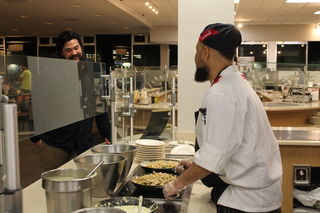The OR gives leftover food to the homeless

A Sodexo worker serves food to a student in the Orleans Room. Loyola has partnered up with Sodexo and initiated a food recovery program to stop the food waste in the Orleans Room. Photo credit: Jacob Schmitt
March 5, 2018
No more wasting food in the Orleans Room. Sodexo workers and Loyola student volunteers will be repackaging and shipping leftovers to the homeless.
Loyola has partnered up with Sodexo and initiated a food recovery program to stop the food waste in the Orleans Room.
“It’s largely been a Loyola initiative,” sociology sophomore Sasha Solano-Mcdaniel said. “The students here have seen the amount of food waste that goes on within the OR and we want to address that. We kind of went to Sodexo and said ‘Hey, would you guys be willing to help us out with this?’ And they agreed to be our partners.”
Around 30 to 40 percent of the United States food supply goes to waste, according to the United States Department of Agriculture.
“That is such a huge environmental impact,” food studies sophomore Julia Gollobit said.
Tulane University has the same food recovery program and has also partnered with Sodexo to repackage food and send it to homeless shelters.
“It’s something that a lot of college campuses have done,” Solano-Mcdaniel said. “Seeing how widespread this is made me think, ‘Why isn’t Loyola doing this?’”
Sodexo is a large food provider that provides food for college campuses, prisons and hospitals.
“There’s a national organization called the Food Recovery Network which is for college campuses,” Gollobit said. “Our chapter would start with Sodexo.”
Students and faculty are trying to start this program at Loyola which would consist of a group of volunteers coming together to weigh and package the food to be picked up by the people from the homeless shelters. The volunteers would meet a few times a week in the evenings after the OR has finished serving dinner.
“It’s a nationwide initiative, so a lot of campus dining halls are partnering up with their students to effectively package the food that would normally be wasted and donate that to local food shelters,” Solano-Mcdaniel said.
This program will give students the opportunity to work on sustainability issues in the dining hall at Loyola. Solano-Mcdaniel said she is excited for the program because it is an easy way to find a productive and effective purpose for the leftover food from the OR that would normally be thrown away.
“I’m just really looking forward to finding an effective use for this food,” Solano-Mcdaniel said. “I know there’s a lot of need for (this food). Just being able to provide for that need and reduce the food waste is better than throwing it away.”
Gollobit agrees that the program will address sustainability issues and is excited to see the impact the program will have on the New Orleans community.
“By seeing all this food that would have just been thrown away, I hope it would make it a more sustainable dining program in general. It’s a great way to help feed people and it addresses so many important issues,” Gollobit said.
The food recycling program is still seeking out volunteers. If anybody is interested in helping out, they should email Edward Wroten at [email protected] for further information.





